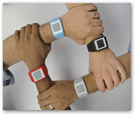MIT had this write up on the bandu device. I looked over at indiegogo, the crowd sourcing page and the goal was $250,000 and see where $7,189 was raised. Will a device as such find a place in the consumer world? I read through the material and you can watch the video below on how it will work with sending the stress level information back to an IPhone. What is interesting is the healthcare claims it makes as there could be some use that has value if in fact they device functions to help patients with PTSD and help with some diagnostic areas. Would I myself wear one just as a consumer with no known issues with stress other than occasionally being stressed out, probably not. I could dig out my old “mood ring” for that <grin>. Furthermore would I want this information sent to someone else, not at all. As you can see I’m not messing with that mood ring anymore either:)
an IPhone. What is interesting is the healthcare claims it makes as there could be some use that has value if in fact they device functions to help patients with PTSD and help with some diagnostic areas. Would I myself wear one just as a consumer with no known issues with stress other than occasionally being stressed out, probably not. I could dig out my old “mood ring” for that <grin>. Furthermore would I want this information sent to someone else, not at all. As you can see I’m not messing with that mood ring anymore either:)
Time will tell what the “watch” technology will do with the sensors and again if it remains more on the clinical side and gets developed with some additional technology sensors, who knows what we might see down the road there. Again I know when I am stressed and I might miss knowing when I am minimally stressed but I don’t want to “stress” out knowing that I missed some analytics that can tell me I had a few minimal stress episodes:) BD
Amid rising concerns over post-traumatic stress disorder (PTSD) and other mental illnesses, two MIT startups are developing wrist-worn sensors that can detect physiological changes—including perspiration and elevated temperature—that may signal the onset of events like anxiety attacks.
The data collected by these devices can be fed into an algorithm that aims to learn what triggers anxiety, or when people may be about to engage in a risky behavior. One goal is to head off destructive behavior, from drug abuse to suicide and violent outbursts, and to help with treatment.
The newest of these startups, Boston-based Neumitra, emerged from stealth mode earlier this year with a device that can measure proxies for excitement or stress, including increased motion, increased skin conductance from perspiration, and elevated skin temperature. The device, called bandu, sends readings to the wearer’s smartphone, which records them for later analysis. The device also includes a display that can be customized to suggest, say, that you take your medication, call a loved one, or listen to a song.
from stealth mode earlier this year with a device that can measure proxies for excitement or stress, including increased motion, increased skin conductance from perspiration, and elevated skin temperature. The device, called bandu, sends readings to the wearer’s smartphone, which records them for later analysis. The device also includes a display that can be customized to suggest, say, that you take your medication, call a loved one, or listen to a song.
http://www.technologyreview.com/news/508716/wrist-sensor-tells-you-how-stressed-out-you-are/



This sounds like a pretty great device and I love how it's able to learn what triggers anxiety, it should get a lot of good data.
ReplyDelete